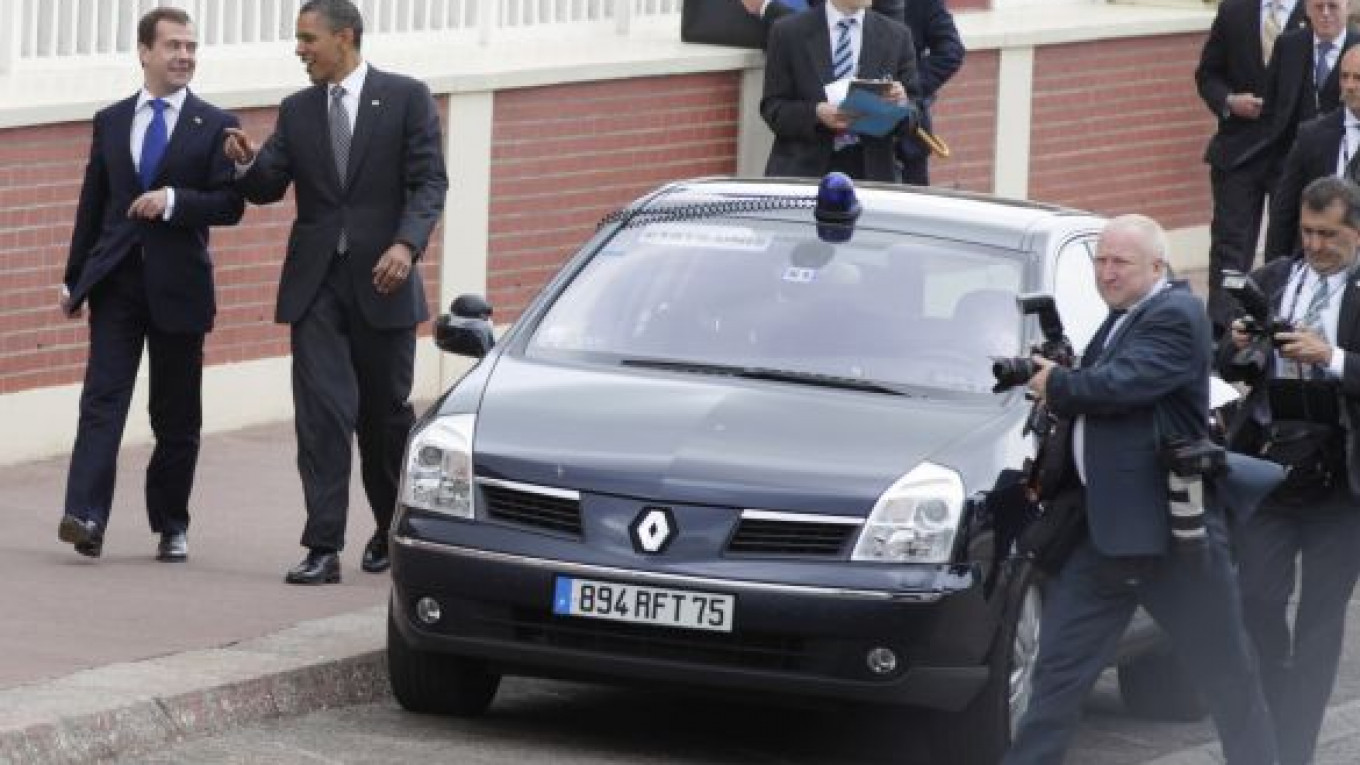France will help build $2.84 billion worth of resorts in the North Caucasus, according to an agreement the French and Russian presidents signed Thursday ahead of the official opening of the G8 summit in Deauville.
"The presidents have decided to include the project of creating a tourist cluster in the North Caucasus among the priorities of the strategic partnership between the two countries," Dmitry Medvedev and Nicolas Sarkozy announced in a joint statement.
After the meeting Medvedev also announced that the long-awaited 2 billion euro ($2.8 billion) contract for four Mistral-class helicopter carriers would be signed within the next 15 days.
Under the resort agreement, France will help develop and manage ski resorts in the Adygeya, Karachayevo-Cherkessia, Kabardino-Balkaria, North Ossetia and Dagestan republics. French companies will also be involved in building health resorts on the Black and Caspian seas, Interfax reported.
The joint venture to develop the Vysota 5642 tourist cluster is valued at $2.84 billion, Akhmed Bilalov, vice president of the Russian Olympic Committee, said on May 24 in an interview with Ekho Moskvy. Thursday's statement did not give details on the expected investments.
The agreement also called on French experts to advise their Russian partners on investment plans, marketing strategies and the legal framework.
"France has a unique and multifaceted experience and knowledge in the area of complex development of mountainous regions and the realization of large-scale projects in the tourism area," the presidents wrote in the joint statement. "France is ready to fully present this experience to the Russian side."
The French bank Caisse des Depots et Consignations and the Russian state-owned North Caucasus Resorts Company will form a joint enterprise to attract investors to the project, according to the statement.
The partnership agreement between the two companies is expected to be signed at the St. Petersburg International Economic Forum in June.
French companies want guarantees that their investments will be returned in case terrorist acts or military violence disrupt business in the volatile region, Vedomosti reported.
Business is most problematic in Dagestan and Kabardino-Balkaria, said Alexander Skakov, a North Caucasus expert at the Central Eurasia Research Center. But foreign companies will likely get more support than their Russian counterparts.
"It is quite possible that these companies would get more protections than companies from Moscow or elsewhere in Russia," Skakov told The Moscow Times.
He added that the government could encourage businesses to come to the region by minimizing tariffs, easing passport control for company workers and helping with real estate rentals.
Details on how investments will be protected in the Russian-French deal had not been released by press time Thursday.
A Message from The Moscow Times:
Dear readers,
We are facing unprecedented challenges. Russia's Prosecutor General's Office has designated The Moscow Times as an "undesirable" organization, criminalizing our work and putting our staff at risk of prosecution. This follows our earlier unjust labeling as a "foreign agent."
These actions are direct attempts to silence independent journalism in Russia. The authorities claim our work "discredits the decisions of the Russian leadership." We see things differently: we strive to provide accurate, unbiased reporting on Russia.
We, the journalists of The Moscow Times, refuse to be silenced. But to continue our work, we need your help.
Your support, no matter how small, makes a world of difference. If you can, please support us monthly starting from just $2. It's quick to set up, and every contribution makes a significant impact.
By supporting The Moscow Times, you're defending open, independent journalism in the face of repression. Thank you for standing with us.
Remind me later.






